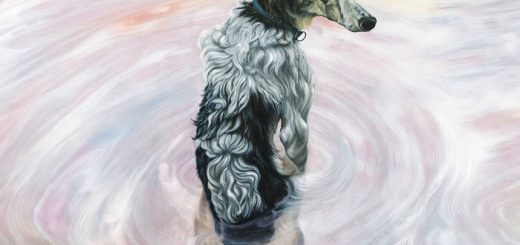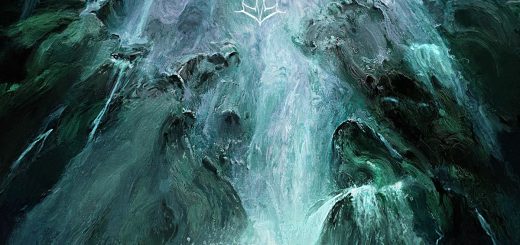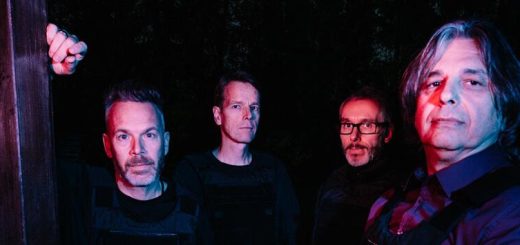Haken: ‘Virus’ Review
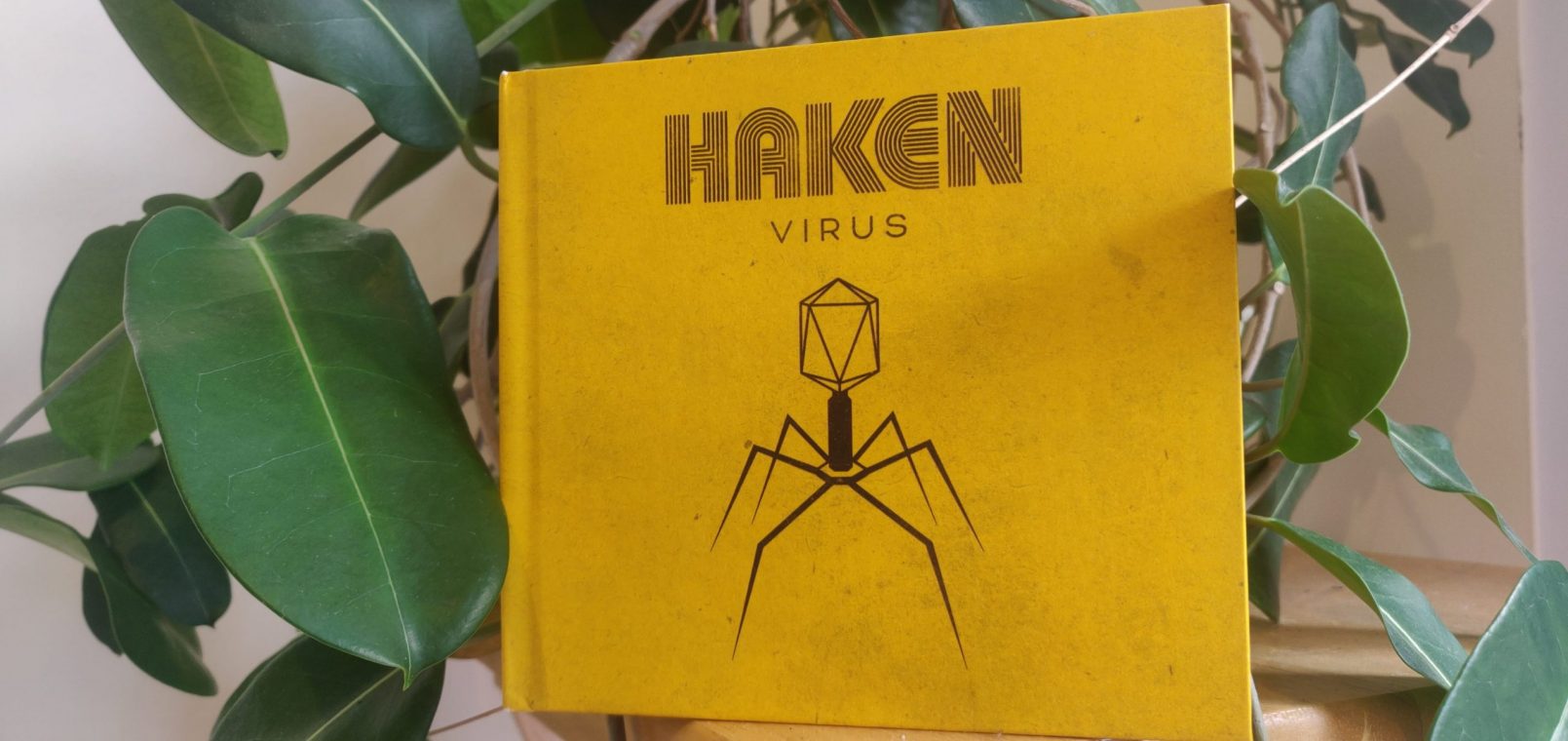
Haken Virus Mediabook Edition
Only two years since ‘Vector’ was released, Haken are back to finish off the the origin story of the cockroach king. First presented to listeners in their 2013 album ‘The Mountain’, the song ‘Cockroach King’ has been a fan favourite track for over half a decade for many Haken fans. As such, the band decided to embark on writing a double album dedicated to the lore and backstory of this mysterious character.
Starting with ‘Vector’ in 2018, fans weren’t privy to the fact that this album was only one half of the story being told. When ‘Virus’ was teased at the end of a livestreamed concert in March of this year, the hype started to rile up. Two days later ‘Prosthetic’ was released as the first single of the new album. Later it was revealed that we would be hearing more about the Cockroach King and his origin story. ‘Virus’ marks Haken’s 6th studio album, and 7th release overall in their discography.
Full of punchy riffs, ‘Prosthetic’ is a hard hitting opening for the album unlike previous releases where we’ve had ambient instrumental buildups such as ‘Clear’, ‘Affinity.exe’, and ‘The Path’. The album starts as it means to go on in what is largely a change in compositional direction for the band. The slower more ambient tracks have disappeared from the lineup and have been replaced with relentless metal riffs with sonic breaks being few and far between.
One big critique I’ve heard is that Haken are starting to sound more like other bands such as Periphery, and are evolving away from their original sound and compositional style. It’s not the first time something like this has happened in this world of progressive music. Take Anathema for example, who have very successfully transitioned away from doom metal into a far more mellow sound over the last decade. As well as Opeth, who have moved from death metal into jazz metal.
However, the Periphery comparison in this case is not really a stretch to make when ‘Virus’, as well as ‘Vector’ has been mixed by the former Periphery bass player Adam Nolly Getgood. Given the direction that ‘Vector’ took in terms of moving even further towards heavier sounds than Affinity’s move away from The Mountain, Virus has solidified Haken’s new reputation as a djent band with an unfortunate lack of prominent synthesis writing which is what previously brought me to loving their sound in the past.
Take ‘Carousel’ for example. I think it’s reasonable to compare that to a track like ‘1985’ from Affinity, an early album track that’s on the longer side, and has it’s own clear identity with a number of memorable hooks, licks, and riffs from all of the players in the band. And while there’s a some of that within ‘Carousel’, the track as a whole feels repetitive in comparison. There are some softer sections that bring the track life however; particularly Connor’s bass solo which stands out to me in particular. The track is certainly enjoyable as a whole, especially the absolutely killer guitar solo around 5:20. However there are no genre defying elements in here. And whilst within their own discography it’s certainly a new venture into heavier sounds, it doesn’t leave as big a legacy on the wider progressive music genre as much of their previous work has in the past.
‘The Strain’ and ‘Canary Yellow’ aren’t especially memorable for me within the context of the album. They blend into the tracks around them using the same guitar tonalities and textural styles. The melodic writing is reasonably similar as well thanks to the continual use of ‘djent’ style guitar work and lack of isolated synth parts. I think again the issue for me is that there’s a big lack of push and pull when it comes to the pacing of the full album. In isolation all the songs are objectively very enjoyable, but when placed together they all create the exact same atmosphere (with the exception of ‘Only Stars’).
The start of ‘Messiah Complex’ has such a huge opportunity to build tension, and it’s completely missed. This suite should be the pinnacle of the entire Haken discography so far, linking multiple albums together, namely ‘The Mountain’, ‘Visions’, and ‘Vector’. And yet no atmosphere is created. Take a song like Dream Theater’s ‘Octavarium’ which has a magnificently executed atmospheric buildup with an outrageous synth solo from Jordan Rudess. Or perhaps even previous Haken epics like ‘Aquarius’ and ‘Visions’ which both have dramatic orchestral build ups before getting into the guts of the finale tracks. ‘Messiah Complex’ just leads straight into more plain guitar riffs with no textural or melodic variety from the rest of the album, continually making it hard to differentiate as the big epic that it’s been built up to be.
There’s a handful of references to previous tracks in their discography inside of ‘Messiah Complex’ building up the lore of Mountview Institute and the Cockroach King, but it just doesn’t lock me in. ‘Vector’ was a melodically interesting quest into the lore of the band, but I really don’t feel like extending this out into a second companion piece was worthwhile from a storytelling, or musical development perspective.
My other outstanding issue with ‘Virus’ is that I’m sat asking myself where is Diego? His presence throughout the album is entirely lacking. I counted a grand solo of two solos, one on ‘Invasion’, and one in ‘The Sect’ movement of the ‘Messiah Complex’. His solo on ‘Invasion’ is probably one of the biggest highlights on the album for me. The patch sound is completely filthy and serves the song very well. It’s worth noting though that the second solo is merely a reprise of the first using the same synth patch. Granted a lot of the work that he’s done is background atmosphere building with pads, but most of what you can hear is just tripled guitar parts. And even then, his work is incredibly low in the mix.
Every moment the guitars are turned up to eleven bursting at the seams to take over the mix leaving no room for the other musicians to shine through into the foreground, for textural variety, or to allow the music to breathe. Even death metal albums generally have more guitar breaks than ‘Virus’ did.
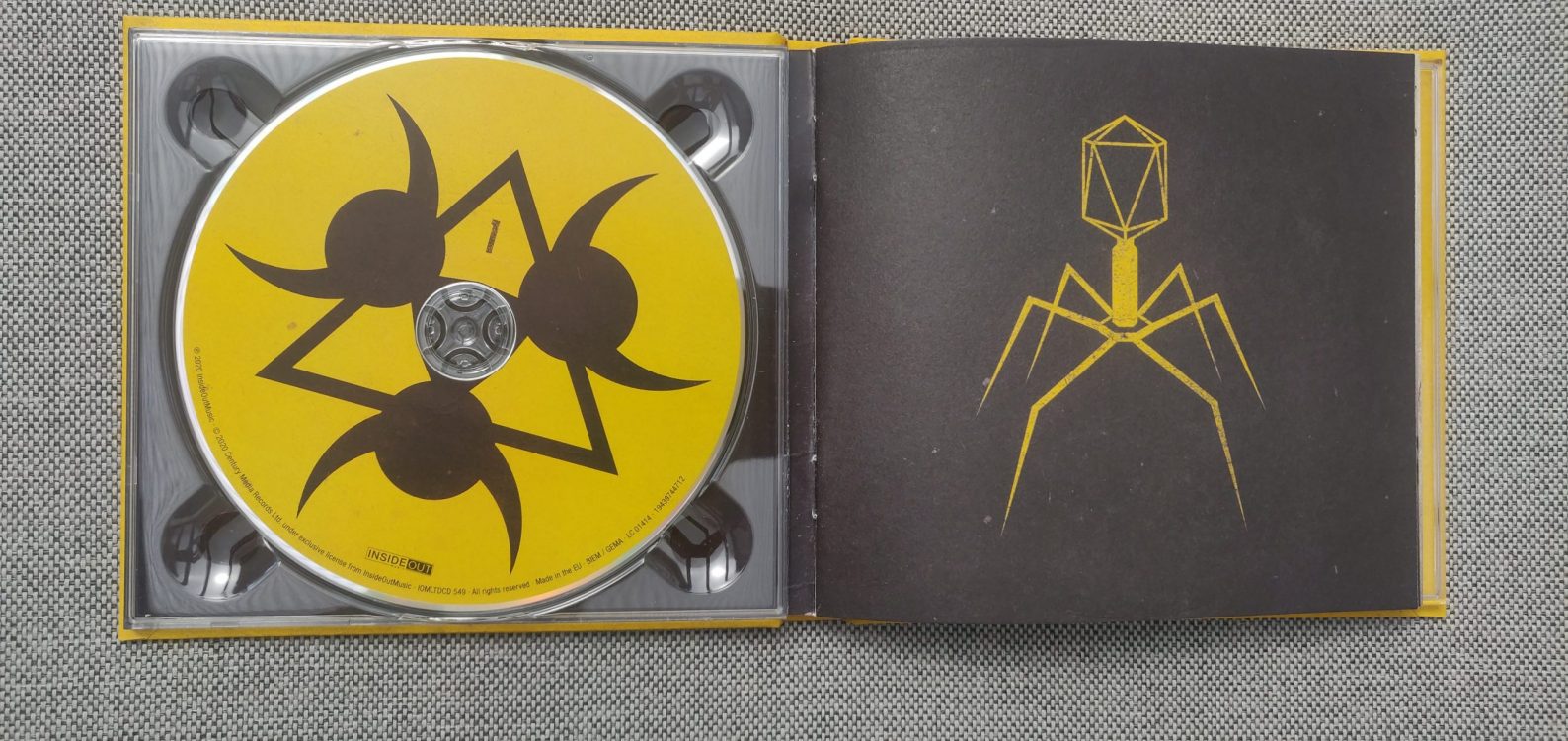
Inside the deluxe edition of the Virus CD
And to not be too negative, I should highlight here that the guitar playing is generally fantastic throughout the album, as well as in the drumming department. Richard, Charlie, and Raymond all play incredibly tightly throughout out across a large number of technically complicated riffs and solos. Even though in the past these musicians have proven that they are highly trained and talented, it’s even more clear now than ever before thanks to the constant onslaught of riffs.
I think to conclude, the big issue for me is that none of the songs have clear identities. You could play me a random 10 second snippet from the album, and I probably wouldn’t be able to tell you which track it’s from. I’m also not sure there was enough of an interesting story around the Cockroach King to create two entire albums about him, but it’s been done now. I hope that this marks the end of the Cockroach King and that Haken move onto something completely fresh, and possibly more mellow with their next release. Similar to how Affinity had constant themes, but wasn’t a cohesive work that needed to be digested as one.
I’ll certainly still be spinning this album despite it’s flaws as ultimately it is enjoyable, it’s just not going to be my favourite Haken album. And that’s okay.

